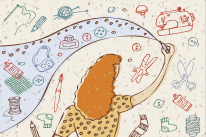
“Remember that there is no magic wand that can take away the pain and grief. The best any of us can do is to be there and be supportive.” ~Marilyn Mendoza
My mother, an articulate and highly accomplished writer, began to lose much of what she valued a few years ago. Her eyesight was compromised by macular degeneration, her hallmark youthful vigor was replaced with exhaustion, and many of her friends began to die. Finally, and cruelest of all, her memory began to go, slowly at first, and then with increasing speed.
Her struggle and her suffering in the last two years of life were excruciating to watch, and I was helpless to stop what felt like an avalanche of cruel losses.
Sometimes in that last year, she would call me several times a day with distress and confusion. When she finally died, after five ambulance trips to the hospital in six weeks, my first response was thankfulness that she was out of the struggle and, to my surprise, relief. I had been grieving the mother I had known for the last year of her life, and she had already been gone a long time.
It would be another month before I found my grief, and I suspect that it will be there forever; but my immediate feeling was not sadness.
People feel so many things at so many different times about the death of a loved one: loss, anger, devastation, confusion, guilt, and fear, to name a few. If we assume anything about how they are experiencing their loss, we can make them feel worse. Here are a few suggestions about how to reach out, starting with what not to do.
Don’t assume you know what I am going through.
I was surprised by how many people came up to me and said, “I know just what you’re going through.” Even worse, they would tell me, “This will be the saddest thing that will ever happen to you,” or “You won’t know who you are for years after this.”
We all know that losing a mother is a major life event and it changes many things. What we don’t know is how. It is different for each person; we cannot overlay our own experience on someone else’s and assume it’s the same. For me, whose first feelings were that her death was that of a reprieve, it caused me to doubt the validity of my response.
Don’t use religious clichés about this life or another.
Religious clichés such as “Jesus called her home,” “God needed another angel,” or “it’s in the hands of the Lord,” were infuriating. For one thing, my mother was not a Christian, nor am I. I love the Jesus story, but it doesn’t resonate for me as the only true story, and it sure doesn’t help me feel better about my mothers’ death.
Don’t say “there is a reason for everything.”
Then the cards began to come filled with familiar clichés: the worst was “there is a reason for everything.”
That feels to me like a way to do a “wrap up” on something that is fragile, personal, and unknown. How do you know there is “a reason for everything?” It insults grief by trying to dilute it into a rational cosmic plan.
You cannot explain, rationalize, or sum up my loss in a tidy little cliché. My reaction to those messages was not to feel more comforted, but to feel more isolated.
Don’t talk about her “passing.”
Talking about people who have “passed” feels like minimizing what happened and avoiding the word “death.” It is a tough word, it is final and irreversible and filled with loss. But it is a true word. It is what we have to manage, and the hugeness of the word, death, in its finality and brutality is what allows us to find our necessary grief.
There were people who said things that did comfort me.
1. I wish I had the right words, just know I care.
2. I don’t know how you feel, but I am here to help in any way I can.
3. Would you like me to bring you some enchiladas on Tuesday?
4. What was this like for you? I’d love to listen if you would like to talk about it.
Here is the most important thing for you to know.
Each of our relationships has a bubble around it. Within that bubble is the history of what we have shared. Grief is a part of the human experience, and we grieve not just for the person who has died, but also for the part of our history they take with them.
Losing a mother is a major life change regardless of what the relationship was like. But we don’t know what that is like for anyone but ourselves. When we assume we do, we belittle their experience and lose a chance to know them better.
Although we may intend to connect with the other person, sometimes the opposite happens and what we say makes them feel worse. When we invite them to share their own experience, we help to break down the isolating walls of loss and inspire a true connection.
About Linda Carroll
Linda Carroll is the author of Love Skills and Love Cycles. While she has worked as a therapist and couple’s coach for over three decades and has acquired numerous certificates and degrees along the way, she says that her own thirty-five-year marriage is the primary source of her knowledge when it comes to the cycles of love. Visit her online at lindaacarroll.com or lindacarrollofficial on instagram.












 Though I run this site, it is not mine. It's ours. It's not about me. It's about us. Your stories and your wisdom are just as meaningful as mine.
Though I run this site, it is not mine. It's ours. It's not about me. It's about us. Your stories and your wisdom are just as meaningful as mine.
Wow this couldn’t be more on point! Since I lost my daughter at age 7, I have tried to avoid all those comments that just annoyed the crap out of me and didn’t help. I understand they don’t know what to say, but sometimes silence is just better. I am sorry for the loss of your mother, and I thank you for sharing this.
Thank you for a lovely article about the death of your mother, the reactions that followed, and your feelings.
So sorry for your loss
I understand your perspective, but I heartily disagree. Many individuals hearts are in the right place even if they speak cliches concerning my adversities, that in my opinion, is showing up, or a form of supportive action. To each his or her own concerning care, kindness, and politeness. I have had the pleasure of dealing with death ten times over, personally and while in the Army. Concern is concern in my opinion. It is not a new technique in psychology on how to “deal” with life’s little inevitable annoyances or nuisances. I humbly thank everyone who showed concern for me, however they broached the subject.
I agree with this comment. As someone who lost their mother a few years ago, there is no ‘one size fits all’ approach. There is no “right” thing or things to say, and what may or may not resonate with you may be different for someone else. The author is correct in that people don’t know what the situation feels like unless they’ve been in it. Knowing that, understand that people do their best for the most part. I was so sick of people saying, “Let me know if there’s anything I can do…” after about the 30th time. But honestly, what else could they have said? It’s probably what I would have said if the roles were reversed…
I don’t believe she was judging anyone. That is why the article is titled “what to say and not to say”. She is trying to get the word out there to help those that may not know the right thing to do or say. Those of us that read this will think twice now won’t we?
Hi Linda,
I am so very sorry your Mum died. Your description of her made me wish I could have known her. I agree with you that grief is complicated and individual and that when a grieving person is so vulnerable it is important to try to suit ones’ words to the individual and to the situation. And that can be difficult. But I do think it is important to acknowledge the death; just say how sorry you are, if other words do not come . After my mother’s death from Alzheimer’s disease, one or two “friends” simply ignored it. One of them, whom I asked directly if she knew Mum had died, told me she was “uncomfortable” and didn’t know what to say, and so chose to say nothing. I’m afraid that elephant stomped all over the friendship, and I lost a good friend as well…..
I disagree with this whole post. Every person who took the time to fumble out some cliche words meant to comfort or support me helped me to know that I wasn’t alone and that I wasn’t alone in not knowing what to say or how to feel. If some Christian or Muslim or Jewish person is praying for me to the God they believe in, I’m grateful. Heck they may be right and I’m wrong and their prayers are a comfort to my dead relative now that they are in heaven or paradise or wherever. Be grateful that people care about you, especially those who don’t even know you well enough to have the right words but still took the time to care and put themselves out there in all their awkward glory.